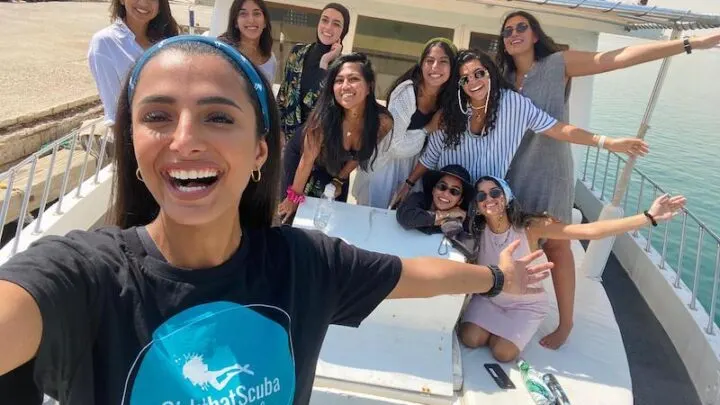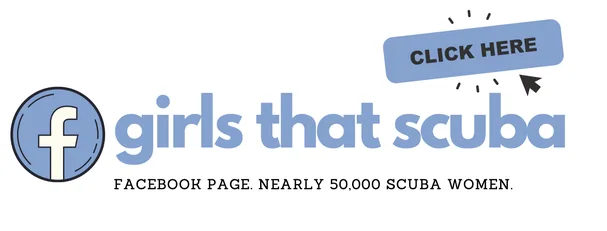Once the underwater world has captured you, it’s easy to start thinking about how you can make it your everyday life by looking into scuba diving jobs. We’ve already explored how to get scuba diving jobs and shared the salaries of common scuba careers, however, much of that was focused on instructing jobs. In our nearly 50,000 strong Facebook group, we are asked constantly “What scuba diving jobs are out there which don’t involve teaching?”
We recognise that instructing and being responsible for new divers isn’t for everyone, so we’re here to shed some light on alternative scuba jobs. Six women from our GTS community kindly shared with us the ins-and-outs of their unconventional scuba careers – from what their jobs involve on a day-to-day basis to the steps they took to succeed in their careers, and why they each love their unique scuba job. If the sound of being an underwater helicopter escape instructor, documentary producer, or recovery team diver gets you intrigued, read on to learn more!
Jenni Collier – Underwater Photographer and Digital Marketer – Indonesia
If you feel like you’ve seen Jenni’s name before around here, that’s because she was responsible for the awesome photos from the 2020 Girls that Scuba day in Gili Trawangan. Here’s what Jenni had to say about what her job involves:
“My job as an underwater photographer/videographer is forever changing. One day I may be taking underwater photos for someone while they are on their first dive, and some days I get to go out with my best friends or expert divers and experience incredible marine creatures in their natural habitat. A huge part of the job involves interacting with people and sharing stories. This aspect, plus being in a remote location, means you meet some pretty awesome people. I do a lot of editing and marketing behind the scenes too which is great when you need a break from the sun and heat in the air con!”
Like many, Jenni was mostly self-taught in underwater photography and developed her skills on the job. She didn’t specifically set out to make this her job, as she told us: “I began my career working in TV production studios in Australia while studying film and television. When I quit my job in Sydney, I headed to Indonesia for a vacation and found Manta Dive. I completed my divemaster training and convinced the bosses to let me take photos of customers. I was lucky it was a success and I haven’t stopped since! I started with a very basic camera and learned to use what I had, and over time I built up to more professional equipment. I also learnt more about marine life and using underwater models. Now my photographs are featured on online publications including the Girls That Scuba website!”
Her love for her job goes deeper than just the day-to-day, as photography plays such an important part in spreading messages of ocean conservation. She shared with us: “I love that every diving day is different and you never know what marine life you will see or what behaviour might unfold in front of you. Capturing experiences and sharing the beauty of the underwater world is so rewarding. I find that the more people see and hear about the ocean and it’s life, the more likely they are to educate themselves on what they can do to be eco-conscious in their own life.”
Mariam Al Saif – Founder of Mer Liveaboard Tour Operator – Kuwait
Mariam may be another familiar face to some of you as she’s part of our incredible team of Girls that Scuba Ambassadors. Mariam is a classic example of someone who ditched the 9-5 to chase her dive dreams, and she also offered some insight into what it was like to pivot her business during a huge global shift in the industry – here’s what her job looks like day-to-day!
“With liveaboards, it starts with planning the location to host the trip, finding the best season to go, picking the perfect boat, and coordinating as an agent to getting it all set up. Then it’s all about recruiting people on board. Throughout the pandemic, there’s been a shift from hosting liveaboards abroad to hosting day trips locally. For day trips, it’s about finding which dive centre I want to work with for that week or month. I like to change it up to support different centres. Once people book on, I take all their information down on what gear they need, sizing etc. I like to make dive days out extra special, so I put a lot of time into finding restaurants to sponsor the food on board rather than the standard dive boat catering.”
Mariam took a great approach to bringing diving into her career by combining it with existing skills from her more corporate background: “With a master’s degree in Marketing and a passion for diving, hosting liveaboards felt like the perfect fit. Getting my name out there was important when establishing myself within Kuwait as a dive tour operator, so I spent time joining exhibitions and networking. Engagement on Instagram has helped me feel connected to other divers, creating a sense of familiarity when they book on my trips.”
Much like our Girls that Scuba network, people are at the heart of what she does. “I love knowing that I have found a community, and that others have found one through Mer! Once you have a trip with Mer, you usually find yourself back again since the people who join in are all like minded individuals who are looking for lifelong friends.”
Sheren Rose – Helicopter Underwater Escape Instructor at Royal Naval Air Station – Yeovilton UK
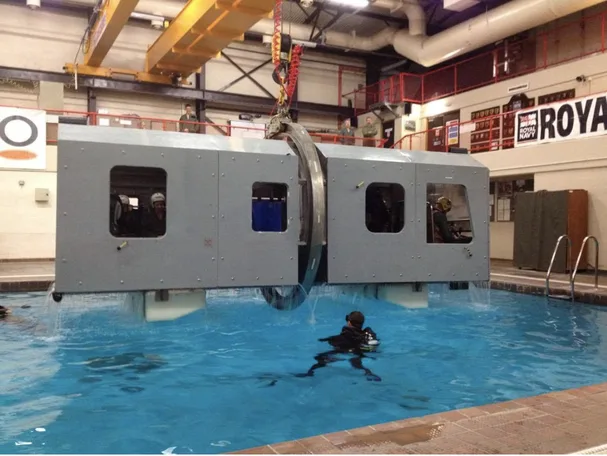
When Sheren reached out to share her role we knew we had to include it in this feature as it stood out as an extremely niche (and fascinating!) job. She can explain a lot better than us, so here’s what her job entailed:
“Helicopter underwater escape training involves training members of the military to escape from a helicopter should it ditch at sea. Helicopters are likely to invert in water, so students are trained to escape from their safety harness, underwater, in scenarios such as daylight, twilight, or night. This is done either on a breath hold or using a STASS bottle (small cylinder with a mouth piece).”
Sheren’s job involved being adaptable and taking on different positions depending on the day: “During training you could be covering one of four different roles. The diving safety supervisor has overall responsibility for operations and is responsible for all people in the water. This includes carrying out all safety checks, ensuring recompression chamber is ready for use in emergency, checking pool temperature and chemicals, setting up equipment, operating the crane with helicopter module attached,and acting as primary dive medic for the day. The surface support role involves general assistance to the dive supervisor, such as writing out certificates or assisting in emergencies.”
“The instructor briefs students on helicopter underwater escape in a classroom presentation, then provides in water instruction and demonstration on use of STASS and underwater escape. They are present inside the helicopter module in water to instruct and prevent problems should anyone become stuck or disoriented. They primarily operate on breath hold with a STASS bottle for back up. Also in the water in full scuba equipment (but outside of the helicopter module) is the safety diver. The safety diver is responsible for alerting the dive supervisor if there is a problem underwater or inside the helicopter module (someone stuck or out of air etc). The safety diver would assist the instructor in an emergency, and acts as the dive supervisor’s eyes underwater.” Once the action of the underwater training was complete, Sheren was also required to take on a secondary role such as checking and maintaining the recompression chamber, maintaining equipment, preparing presentations, collating data from courses, or checking health and safety.

Although Sheren had worked as a dive instructor herself, the minimum requirement for the job is Rescue Diver. You must also have dive medical clearance (HSE medical which is specific to workplace diving in the UK), a good level of general fitness, competency in the water, and breath hold ability. Secondary skills such as recompression chamber operator, dive medic, or equipment maintenance are also needed.
As well as enjoying the high risk environment, Sheren liked that the job involved meeting varied people. “Students included SAS (Special Air Service), SBS (Special Boat Service), helicopter pilots and Royal Marines. I enjoyed getting to go on military training exercises, such as amphibious armoured vehicle days and helicopter familiarisation flights, as well as sea survival training.”
Maddison – Deputy Sheriff and Member of Special Team MOURT (Marine Operations Underwater Recovery Team) – Florida
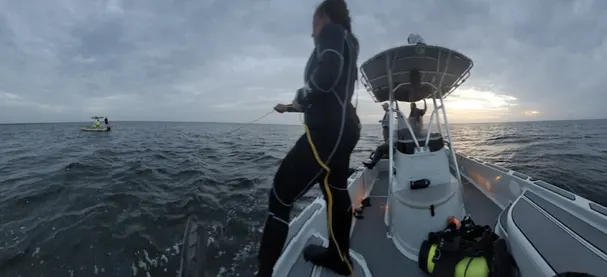
Yet another fascinating (and often asked-about) job came from Maddison. Maddison is a Deputy Sheriff based in Florida, and she is part of a special team which involves scuba diving when necessary. Here’s what she gets up to in her job:
“We are a part time specialty unit which means we only get called out when the need arises. We respond to all stranded and missing boaters, boat crashes, vehicles sinking in the water, or any other water based call for service. We also do increased water patrols on large holidays such as Labor Day and July 4th. We do both rescue and recovery, whether that recovery may be an evidentiary item such as a firearm or a body.”
Maddison gave us a recent real-life example of a time she was called out, in which the team were looking for a crashed airplane and two missing occupants, and shared how they work to communicate with one another. “This is a photo of me line tending while another team member was diving. We use sonar to locate points of interest and mark them with a buoy. We then send divers down to check the area out. The divers are always connected to somebody on the surface through a rope and we have set rope signals that we all understand”.
Whilst opportunities and requirements for this particular role will vary hugely depending on location, here’s the route Maddison took: “Our agency requires you to be a sworn law enforcement officer, however some agencies only require you to be employed by them in any capacity. I have my BA in Criminology, law enforcement officer certification through the state of FL, and my Open Water certification through NAUI. We train 12 hours a month and typically use drysuits and a full face mask with underwater communications.”
Much like the other women in this article, Maddison’s job satisfaction comes from combining diving with her other passions. “I love my job because I get to continue assisting people, but also incorporate my love of the water. There is a large amount of trust between team members and I can count on them to have my back if something goes wrong. No dive is ever the same and I can sometimes assist in bringing closure to a grieving family.”
Kristin Paterakis – Producer/Writer/Photographer for Changing Seas – South Florida
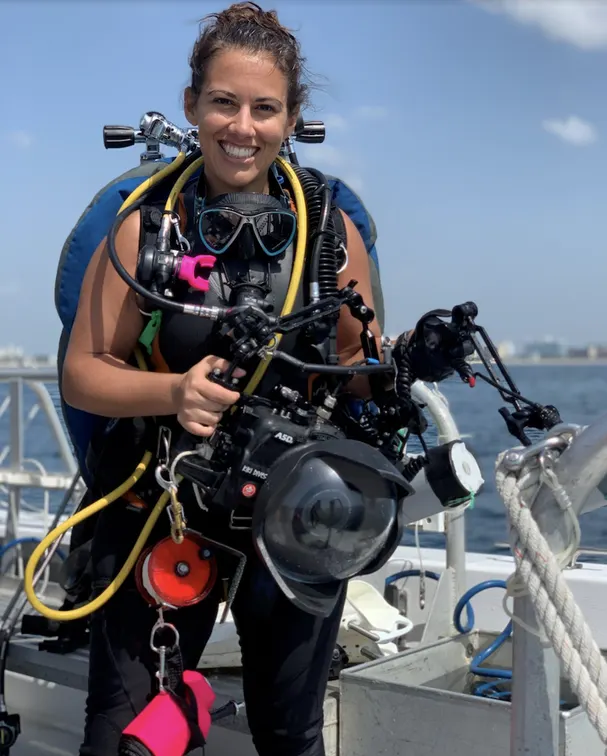
Another Florida-based GTS member with an entirely different career is Kristin, who works in production for a scientific ocean-based TV show. Like many of the other jobs, Kristin’s everyday can be extremely varied.
“Every day of my job is something different. The best days are when we are out filming with marine scientists; I’ve had the opportunity to film scientists studying coral disease, experts studying tiny worm-snails on shipwrecks, explorers diving deep into Florida’s Blue Holes, and now I am working on an episode about sharks and manta rays in Florida. Other days include researching topics, filming interviews, script-writing, and basically working magic. I am also in charge of Changing Seas’ social media and our outreach events.”
Kristin’s background is a combination of formal education and scuba-specific courses, and whilst being an instructor isn’t specifically required for her job, she has found it advantageous. “Receiving my master’s degree in Environmental Anthropology really helped me become a better writer. During this time, I also took a class on digital storytelling which inspired me to pursue filmmaking as a career. I have no formal training in film or photography, but I started with an older DSLR and watched a bunch of YouTube videos. Becoming a better diver is an absolute must for producing and filming underwater, so I recommend training up to at least Rescue Diver and diving as much as possible in different environmental conditions. I am also an Open Water Instructor and technical diver; this training has come in handy more than once on shoots and helping out with some surprise situations. Being confident in the water and on boats allows me to help the scientists feel at ease, because if you aren’t comfortable in the water, how do you expect the people you are filming to be?”
Working alongside so many incredible scientists definitely has its advantages and rewards, and this really adds to why Kristin enjoys her work: “I love learning more about the marine environment and those that are dedicating their lives to learning more about the ocean and protecting what they love. This job has allowed me to see new environments and new creatures that live right in my backyard that I didn’t know existed. It is such a great feeling during some of our events when “fans” of all ages come up and share stories with how much the episodes have inspired them to learn more and care more about our marine environment. I was completely new to the industry and after just three years I won a regional Emmy award for the first episode I produced – such an honorable accomplishment.”
Margriet Schuur – PADI Regional Manager (Netherlands and Flemish Belgium) – Netherlands
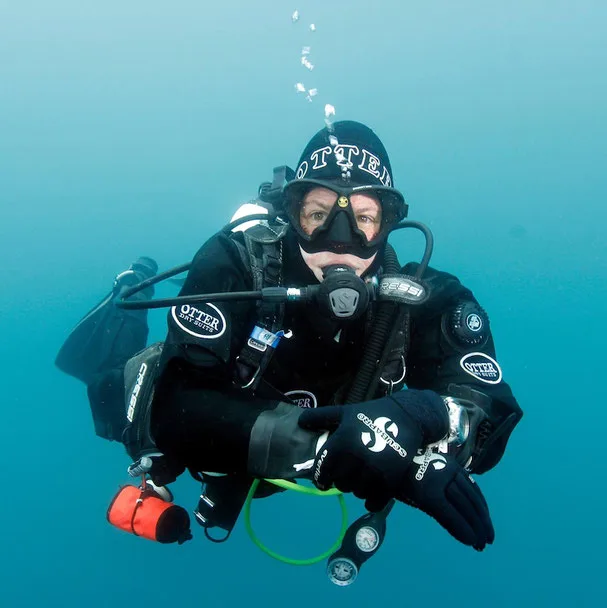
Our final job role – working as a manager for a dive training organisation – doesn’t directly involve teaching but requires a background in dive instructing, so may be of interest to those who are looking for a progression following an instructing career. Margriet was extremely passionate about working alongside so many women in the Dutch dive industry, and here’s what she had to share about her role:
“As a Regional Manager, I represent PADI in the field. I work directly with the members (dive centers) in business development and marketing support, and through training (now online) and events for all PADI members. Representation also means making sure PADI is involved in the industry and very visible in the market. For example, you will find me at the national dive show Duikvaker, and I was involved in writing the Netherlands national protocol on how to safely conduct dives and teach diving during coronavirus. Day to day, I answer emails, conduct webinars, and talk to dive centers about how to improve their business. I am your go-to-girl for every PADI related question and will either personally answer or make sure one of my colleagues in the office will provide you with whatever service you need.”
The basis of Margriet’s success is in a strong instructing background. “In my job you need several things; teaching experience to really understand the members and how the industry works, and excellent communication skills as we deal with every possible problem (from questions about course prerequisites to accidents). I have a university background (Master of Art/History), but decided to teach diving full time abroad in 2008. I have lived and worked as a PADI instructor in Malta, Thailand and Egypt. In 2014 I returned to Europe and got a job with PADI EMEA (Europe Middle East and Africa) as a sales consultant. I then moved up the ranks and became a regional training consultant. Since 2019 I have been the Regional Manager for my region. I am also a PADI Course Director.”
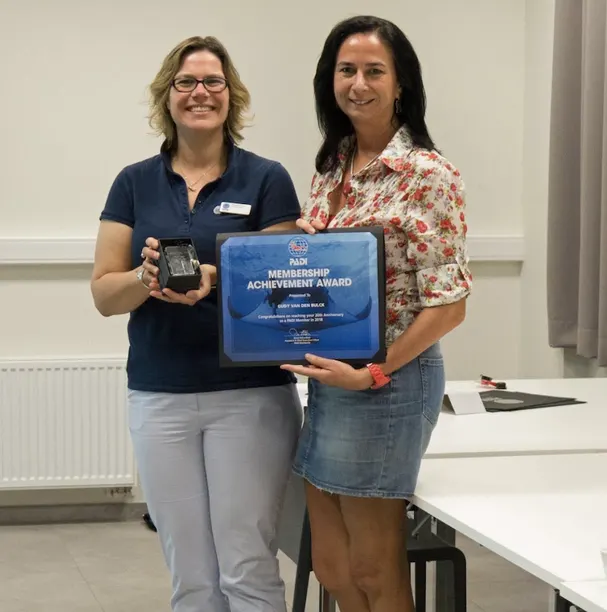
Like many of the other women featured in this article, Margriet’s career satisfaction comes from sharing her love of the ocean with others: “I love that I get to represent the PADI organisation and its torchbearer mission of creating advocates for the ocean through educating divers. I believe in the teaching system and that this is really the way to learn to dive. I love that I get to help PADI members give people the chance to experience the underwater world and make a success of their business. Working for PADI has been an amazing journey. I’ve met so many truly inspiring people through my job, from divers that have overcome the biggest difficulties, to super smart business men and women, and I have made so many friends all over the world. I’ve been able to make my passion into my job and I enjoy every single day of it.”
Disclaimer – responses have been lightly edited for readability whilst maintaining the contributors’ original meaning.
Thank you to all of six of these amazing women for sharing this insight into their work! Did you know that these amazing scuba jobs existed? Are there any other unique scuba jobs you’d love to get to know? Share with us in the comments below, or join our Girls that Scuba Facebook Group to network with nearly 50,000 women – you might find someone with exactly the role you want to learn about!

